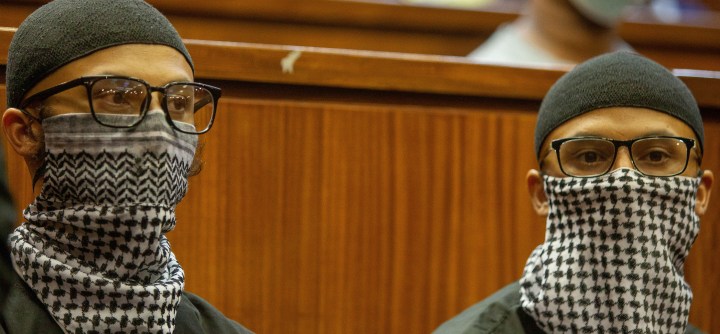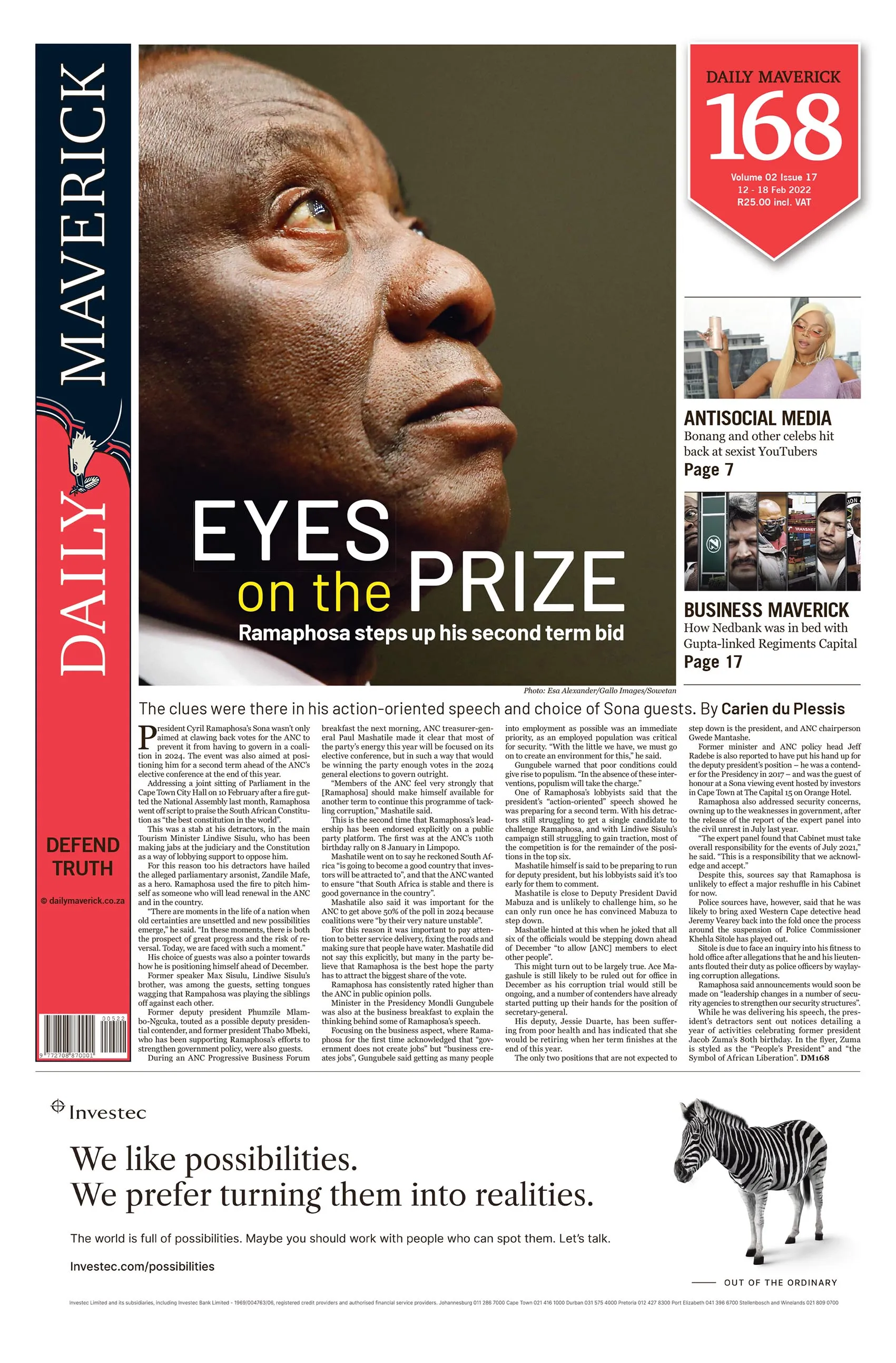JIHADIST THREAT
Thulsie Twins case could provoke local extremists and radicalise more recruits, terror expert warns

The state is starting to take the threat of violent extremism seriously, says an expert, but she fears the Thulsie case verdict could provoke further radical extremism.
Should the conviction and sentencing this week of the Thulsie Twins give us confidence that the threat of Islamic State terrorism is being eliminated from South Africa? Not at all, says terrorism expert Jasmine Opperman.
She acknowledges that the successful conclusion of the case against Tony-Lee and Brandon-Lee Thulsie for trying to join Islamic State (IS) in Syria and conspiring to attack Shi’a, Jewish and foreign targets in South Africa demonstrates that the South African government is starting to take the threat of violent jihadi extremism seriously.
But Opperman also fears that, in the context of poor law enforcement and intelligence, the verdict could provoke further radical extremism that the state will be unable to counter.
Questions are now being asked about whether the state is going to pursue other IS-linked cases, most notably the one against the members of an alleged Islamic State cell led by Durban businessperson Farhad Hoomer. The 12 men were charged with the murder of a congregant in the Imam Hussain Shi’a mosque in Verulam and the planting of many incendiary devices there and in shops in Durban in 2018. A magistrate threw out the case in July 2020 because of the ineptness of the case presented by the prosecutor. There are, however, rumours that the State now intends to revive it.
It’s also unclear when the trial of Sayfydeen Aslam Del Vecchio, Fatima Patel, his wife, and Ahmad “Bazooka” Mussa, their Malawian accomplice, will resume. They were charged with murdering an elderly British botanist couple in the KwaZulu-Natal countryside in 2018, and Islamic State material was also found in their home.
There also hasn’t been much information recently about progress in the case of five people arrested in a house in Kliprivier, south of Johannesburg, in 2020. An Indian national was released. The five are suspected of kidnapping him and others to extort money to finance Islamic State activities.
What these cases reveal – and how they are handled – may provide a pointer to how large the threat of violent jihadi extremism is in South Africa – and how seriously the state is taking it.
The Thulsie Twins, as they came to be called, pleaded guilty in the Johannesburg High Court on 7 February on charges under South Africa’s rarely used Protection of Constitutional Democracy against Terrorist and Related Activities Act of trying to leave South Africa in April 2015 to travel to Syria to join the Islamic State in Iraq and the Levant (Isil). Isil was then at the height of its powers and running a caliphate in Syria and Iraq, a magnet for jihadi extremists everywhere.
In addition, Brandon-Lee was convicted of downloading from the internet a Mujahid guide to conducting terror in one’s home country, including instructions for making bombs and acquiring weapons.
Tony-Lee was separately convicted of conspiring with a foreign Islamic State operative to conduct terror attacks in South Africa in the name of Isil against Shi’a mosques, Jewish events and conferences as well as “foreign interests” at airports.
Tony-Lee was sentenced to 11 years in prison and his brother to eight. The five years and seven months they have already been in jail were deducted from these sentences.
These were the first convictions under the Protection of Constitutional Democracy against Terrorist and Related Activities Act, for international terrorism. This is quite surprising, given that between 60 and 100 other South Africans are believed to have left South Africa and successfully joined Isil.
The Thulsie case revealed the tentacles that reach other sites of Islamic State violent extremism, in a kind of metastasis.
For instance, prosecutor Adele Barnard successfully argued in the High Court in 2020 against bail being granted to the Thulsies on the grounds that they might skip South Africa to travel to Mozambique to join the Islamic State-affiliated Ahlu-Sunna-wa-Jama (ASWJ) violent extremist group. This grouping has been in Mozambique’s northernmost province of Cabo Delgado since October 2017 and recently spread to the westward province of Niassa.
Barnard told the court that Renaldo Smith, the Thulsies’ close friend and accomplice who had tried to leave South Africa with them in 2015 to join Isil, had later fled to Mozambique to become an ASWJ fighter.
“The emergence of ASWJ has presented an opportunity for Islamic State sympathisers from South Africa to engage in active militancy with an officially recognised affiliate without travelling as far away as Syria or Iraq,” as independent South African terrorism expert Brenda Githing’u recently wrote for the Hudson Institute.
She noted Smith had been accompanied on his mission to join ASWJ by Mohammed Suliman – who is now widely believed to have died in battle in Cabo Delgado – as well as 15 other South Africans.
Githing’u noted that an unknown number of accomplices of the five suspected members of a kidnapping syndicate arrested in a house in Kliprivier, south of Johannesburg, in July 2020 were also suspected of having travelled to Mozambique to join ASWJ.
Police suspect the Kliprivier group was kidnapping wealthy individuals to extort money from them to finance IS operations. Islamic State propaganda material and foreign military uniforms were found in the house, as well as weapons. This raised suspicions that it was an IS cell, not only raising finance for others but also preparing to conduct attacks itself.
One of the people arrested was among the 12 suspects in the Hoomer case in Durban who had been released just days before, according to an official source.
The Kliprivier case is continuing.
Hoomer’s name comes up in proximity to a number of these cases, apart from his own. He showed up in the public gallery of the Johannesburg High Court during a few of the pre-trial hearings in the Thulsie case – much to the consternation of the prosecution, who regarded it as a security risk.
His close interest in the case raised suspicions that he could be helping to finance the Thulsies’ defence. According to media reports, there were similar suspicions that he was funding the trial of Del Vecchio, Patel and Mussa for their alleged involvement in the kidnapping, armed robbery and murder of Rod and Rachel Saunders, two British botanists, in KwaZulu-Natal in 2018.
Patel and Del Vecchio were arrested at their home in northern KwaZulu-Natal, where police testified to finding an Islamic State flag.
That case was suspended because of Covid-19 restrictions, but ought to resume soon.
Hoomer was back in the news – and in the dock – in July 2021 when he was among five men arrested in Durban and charged with unlawful possession of firearms, ammunition and suspected stolen property.
The items found by police in a raid on a house in Mayville, Durban, included more than 5,000 rounds of ammunition, a Norinco AK-47 rifle, seven cellphones, two magazines, another rifle as well as diamonds and jewellery. That case was withdrawn from the court roll about a week later, supposedly for lack of evidence.
These cases could, theoretically, be unconnected. But if one joins the dots, they could be pointing to something more than the mere sum of their parts.
“The aforementioned cases have raised concerns that South Africa now faces an imminent threat of jihadist terrorism,” Githing’u wrote.
And the ASWJ insurgency in Cabo Delgado figures prominently in the scenarios of those who fear such a threat. ASWJ is linked to Islamic State through its affiliation with Islamic State – Central Africa Province (ISCAP), which also includes the Allied Democratic Forces (ADF).
ADF commits frequent atrocities – mainly against civilians – in eastern Democratic Republic of Congo, but has also begun launching terror attacks in Uganda, where it originated.
Opperman notes that ISCAP is one of the most active Islamic State affiliates internationally and believes that the outbound threat from Cabo Delgado into South Africa is increasing.
“If we talk of the jihadi threat to South Africa, we should not confine our minds to South Africa,” she says, recalling that ISCAP, through its mouthpiece Al-Naba, threatened in 2020 to retaliate against South Africa if it intervened militarily in Cabo Delgado to fight the insurgency.
Former state security minister Ayanda Ddlodlo admitted that the threat was giving the government “sleepless nights”. This represented a radical turnaround in posture from a government that not long before was dismissing such threats as just a ruse by Western governments to try to entangle South Africa in their war against terror.
South Africa intervened in Cabo Delgado in July 2021, contributing a contingent of special forces to the Southern African Development Community’s intervention force SAMIM, which is still fighting ASWJ/ISCAP.
In the sleepless-nights scenario, ISCAP could theoretically conduct any revenge attacks through the sort of local cells described above – a prospect that adds some urgency to settling these dangling cases. South African jihadists returning from Mozambique could perhaps swell the local ranks.
Opperman worries that the Thulsie case could just irritate and provoke local extremists and radicalise more recruits if it is not coupled with efficient and determined law enforcement and intelligence gathering, which she believes are lacking. Especially because the case was settled out of court in a plea bargain, she notes.
That has left doubts in some peoples’ minds about the credibility of the case. And so, for example, because an FBI agent had posed as an IS operative to elicit part of the evidence against the Thulsies, some hardline Islamists presented the young Thulsies as innocent victims of US “entrapment” rather than of cynical IS manipulation. DM168
This story first appeared in our weekly Daily Maverick 168 newspaper which is available for R25 at Pick n Pay, Exclusive Books and airport bookstores. For your nearest stockist, please click here.

[hearken id=”daily-maverick/9153″]


















 Become an Insider
Become an Insider
Comments - Please login in order to comment.